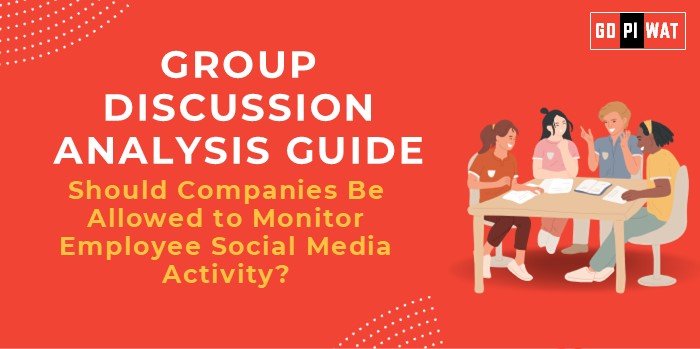📋 Group Discussion (GD) Analysis Guide
🌐 Topic: Should Companies Be Allowed to Monitor Employee Social Media Activity?
🌟 Introduction to the Topic
Opening Context: In a world where 60% of the global population actively uses social media, companies face increasing challenges in balancing workplace productivity and employee privacy.
Topic Background: The debate on whether employers should monitor their employees’ social media arises from growing concerns about data leaks, brand reputation damage, and employee productivity. Modern organizations are caught between protecting business interests and respecting individual privacy rights, making this a key topic for discussion.
📊 Quick Facts and Key Statistics
- Social Media Users Worldwide: 5 billion+ (Statista, 2024).
- Workplace Monitoring: Over 67% of U.S. companies monitor employee internet use and emails (Gartner, 2023).
- Privacy Concerns: 62% of employees believe workplace monitoring violates trust (Pew Research, 2023).
- Impact on Productivity: 30% of productivity loss reported due to excessive social media use (Forbes, 2023).
- Legal Landscape: Varies globally – the EU’s GDPR limits excessive monitoring, while the U.S. allows broader employer rights under specific circumstances.
👥 Stakeholders and Their Roles
- Employers: Ensure data security, protect brand reputation, and prevent misuse of time.
- Employees: Maintain privacy, freedom of expression, and workplace trust.
- Regulatory Bodies: Define boundaries on ethical monitoring (e.g., GDPR in Europe).
- Social Media Platforms: Act as gatekeepers of data privacy and user information.
- Legal Authorities: Oversee and enforce regulations on employee privacy rights.
🏆 Achievements and Challenges
Achievements (Supporting Monitoring)
- Data Protection: Monitoring reduces risks of corporate data leaks and insider threats.
- Brand Reputation: Prevents employees from posting harmful or defamatory content.
- Workplace Productivity: Limits time wasted on personal activities during working hours.
Challenges (Opposing Monitoring)
- Privacy Violation: Employee trust can erode, affecting morale and retention.
- Legal and Ethical Issues: Many jurisdictions have strict regulations, creating legal complexities.
- Overreach Risk: Employers might unintentionally monitor private or sensitive employee data.
🌍 Global Comparisons
- Europe: GDPR emphasizes strong data protection, limiting employer monitoring without consent.
- United States: Employers retain significant rights to monitor social media, especially on company-provided devices.
📚 Structured Arguments for Discussion
- Supporting Stance: “Companies have a legitimate right to monitor social media activity to protect sensitive data and ensure that employees uphold the organization’s reputation.”
- Opposing Stance: “Monitoring employee social media infringes on individual privacy, erodes trust, and creates a hostile workplace environment.”
- Balanced Perspective: “While companies need to protect their interests, monitoring policies must be transparent, limited in scope, and compliant with privacy laws to strike a balance.”
💡 Effective Discussion Approaches
- Opening Approaches:
- Data-Driven Opening: “67% of U.S. companies monitor online activities, but 62% of employees feel this undermines trust. Is workplace monitoring justified?”
- Case-Based Opening: “In 2022, an employee’s inappropriate social media post cost XYZ Corp millions in lost reputation. Does this justify increased monitoring?”
- Counter-Argument Handling:
- “While privacy is important, companies can implement ethical monitoring policies that focus only on work-related activities, ensuring transparency and consent.”
📈 Strategic Analysis of Strengths and Weaknesses
- Strengths: Protects corporate interests and data, reduces risks of reputational damage, enhances productivity by limiting distractions.
- Weaknesses: Breaches employee trust and morale, legal complexities and privacy infringements, high costs for implementing monitoring systems.
- Opportunities: Develop transparent, consent-based policies, introduce AI tools to monitor specific threats without overreach.
- Threats: Legal penalties for unethical monitoring, pushback from employees leading to talent attrition.
🎓 Connecting with B-School Applications
- Real-World Applications: HR Management policies for ethical workplace monitoring, corporate strategy for balancing organizational security with employee rights, implementing AI-driven tools for minimal intrusion.
- Sample Interview Questions:
- “Should organizations prioritize productivity over employee privacy? How would you balance the two?”
- “How do legal frameworks like GDPR impact workplace monitoring policies?”
- Insights for B-School Students: Understand the ethical boundaries of employee management, explore policies on privacy laws and data security frameworks.


